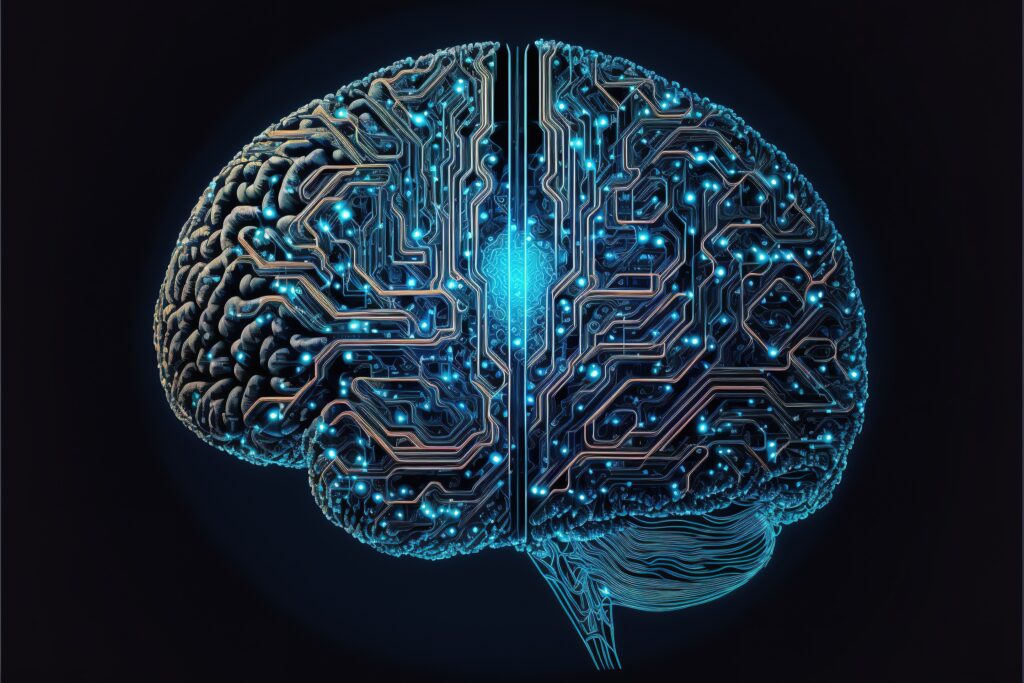
Embracing the AI Marketing Revolution
Welcome to the dawn of a new era in marketing—an era where artificial intelligence for marketing isn’t just a buzzword but a game-changing force reshaping the landscape as we know it.
In the swirling vortex of digital transformation, AI stands out as a beacon of innovation, offering possibilities that were once confined to the realm of science fiction.
Artificial intelligence for marketing is no longer a futuristic concept; it’s very much a present reality. At its core, AI in marketing involves using intelligent technology to enhance and personalize the marketing experience.
Imagine a world where marketing strategies are not just data-driven but also intuitively aligned with customer desires, predicting needs even before the customers themselves recognize them. This is the world AI is crafting in real-time.
The evolution of AI in marketing has been nothing short of meteoric. Just a decade ago, the idea of machines learning consumer patterns and automating complex marketing decisions was a distant dream.
AI’s Meteoric Rise in Marketing
Today, it’s the backbone of many successful marketing campaigns. From chatbots that offer personalized customer service to algorithms that predict buying trends, AI’s integration into marketing strategies is revolutionizing how businesses interact with their audiences.
But what does this mean for the future of marketing? How are these intelligent systems transforming the way brands communicate, engage, and grow? This blog aims to dive deep into the heart of these questions.
The Core of AI Marketing
We’ll explore the multi-faceted role of AI in marketing, from data analysis and customer insights to ethical considerations and future trends. This isn’t just about understanding a technological advancement; it’s about envisioning a new paradigm in connecting with customers.
So, buckle up and get ready to embark on a journey through the transformative world of AI in marketing. Whether you’re a marketing maverick or a curious enthusiast, there’s something in this revolution for everyone.
Let’s uncover together how AI is not just reshaping marketing, but also redefining the pathways to consumer hearts and minds.
The AI Marketing Landscape: Understanding the Basics

Imagine stepping into a world where your marketing tools not only understand your goals but also anticipate your needs and automate solutions. Welcome to the AI marketing landscape, a realm where artificial intelligence is not just an assistant but a dynamic partner in crafting your marketing strategy.
Entering the AI Marketing Era: More Than Just Tools
So, what exactly does Artificial intelligence for marketing entail? In its simplest form, it involves using intelligent technology to make marketing more effective and efficient. AI in marketing is like having a super-smart, data-driven, and insight-generating colleague that works tirelessly to optimize your campaigns.
It’s about leveraging technology to understand and predict consumer behavior, automate repetitive tasks, and deliver more personalized customer experiences.
The Mechanics of AI in Marketing: From Data to Decisions
One of the most fascinating aspects of AI in marketing is the diverse range of technologies it encompasses. Machine learning, for instance, is a superstar in this domain.
It allows systems to learn from data, identify patterns, and make decisions with minimal human intervention. Think of Netflix’s recommendation engine, which suggests shows based on your viewing history, or Amazon’s product recommendations that seem to know exactly what you need.
Another groundbreaking technology is natural language processing (NLP), which enables machines to understand and interpret human language. Chatbots are a perfect example. They’ve transformed customer service by engaging with customers in natural, human-like conversations, providing instant assistance and personalized recommendations.
Technological Stars of AI Marketing: Machine Learning and NLP
AI also extends its prowess to predictive analytics, a technique that uses data, statistical algorithms, and machine learning to identify the likelihood of future outcomes. Retail giants use predictive analytics to forecast demand, optimize inventory levels, and even set prices dynamically.
We can’t forget about image and voice recognition technologies that are redefining user interaction. Voice-activated assistants like Siri and Alexa are becoming integral parts of our daily routines, influencing how brands strategize their voice search optimization.
Beyond Predictions: AI’s Role in Consumer Interaction
In essence, AI in marketing is about combining these technologies to create more intelligent, responsive, and personalized marketing experiences. From email campaigns that use AI to determine the best time to send messages, to social media ads optimized for maximum engagement, AI is everywhere in marketing. It’s not just changing the game; it’s creating a whole new playing field.
As we delve deeper into the world of AI-driven marketing, remember, this isn’t just about algorithms and data. It’s about harnessing the power of intelligent technology to create more meaningful connections with your audience. In the following sections, we’ll explore how this technology is not only transforming strategies but also offering unprecedented insights into consumer behavior. Stay tuned!
Transforming Strategies: How AI is Changing the Marketing Game

Gone are the days when one-size-fits-all marketing strategies were the norm. In this thrilling era of AI-driven marketing, personalization, predictive analytics, and customer segmentation are not just buzzwords; they are powerful tools reshaping the way brands interact with their audience.
Personalization: Crafting Unique Customer Experiences
AI excels in creating personalized customer experiences. Imagine walking into a digital store where everything, from product recommendations to promotional messages, is tailored just for you. That’s AI-powered personalization at work.
Brands like Spotify and Netflix have mastered this art. They use AI to analyze your preferences and behavior, offering recommendations so spot-on that they feel like they’ve read your mind. This level of personalization keeps customers engaged and coming back for more.
Predictive Analytics: Anticipating Customer Needs
Predictive analytics is like having a crystal ball, but instead of vague prophecies, it offers data-backed predictions about customer behavior. Retail giants use predictive analytics to forecast trends, understand customer preferences, and tailor their inventory and marketing strategies accordingly.
For instance, Target famously used predictive analytics to figure out a teen girl was pregnant before her father even knew, based on her shopping patterns.
Customer Segmentation: The Art of Targeted Marketing
AI has revolutionized customer segmentation by making it more dynamic and precise. Traditional segmentation methods were often based on broad categories. AI, however, can segment customers into much finer groups based on nuanced behaviors and preferences.
This approach allows for more targeted and effective marketing campaigns. For example, an e-commerce company might use AI to identify and target a segment of customers who show an interest in eco-friendly products.
AI in Action: Success Stories
Case studies of AI in marketing abound, each showcasing the transformative power of this technology. Take, for instance, Coca-Cola, which used AI-driven chatbots to provide personalized brand interactions. Or consider Sephora, which leverages AI for its Virtual Artist app, allowing customers to try on makeup virtually, thus significantly enhancing the online shopping experience.
AI is not just changing the marketing game; it’s revolutionizing it. By enabling personalized experiences, predictive insights, and precise customer segmentation, AI empowers marketers to connect with their audiences in more meaningful and effective ways.
It’s clear that the possibilities are as vast as our imagination. Let’s turn the page to the next chapter, where we delve into how AI is unearthing deeper insights into customer behavior.
AI-Powered Customer Insights: Decoding Consumer Behavior

In the dynamic world of artificial intelligence for marketing, one of the most captivating narratives is how AI enables us to decode the enigmatic puzzle of consumer behavior. It’s like being a digital Sherlock Holmes, where AI is your magnifying glass, revealing clues and patterns invisible to the naked eye.
Understanding and Predicting Consumer Behavior
AI’s ability to understand and predict consumer behavior is nothing short of revolutionary. It’s not just about looking at what customers have done; it’s about foreseeing what they will do.
By analyzing vast amounts of data, AI identifies patterns and trends that escape human analysis. This is akin to reading a story where each customer interaction is a word, and AI helps you understand the entire narrative.
Take, for instance, how AI examines purchasing histories, social media interactions, and even browsing behaviors. This analysis paints a comprehensive picture of what customers like, dislike, and how they are likely to behave in the future.
It’s like having a window into the customer’s mind, offering invaluable insights that drive smarter marketing decisions.
The Power of Data Analysis and Pattern Recognition
The real magic of AI in marketing lies in its unparalleled data analysis and pattern recognition capabilities. These technologies sift through the sea of data to find actionable insights. For example, a fashion retailer can use AI to analyze purchase history and social media trends to predict what styles will be in demand next season. This level of insight is not just helpful; it’s a competitive advantage.
Real-Life Examples and Applications
Real-life applications of AI in marketing are both impressive and inspiring. Consider how Starbucks uses its AI-driven recommendation system to offer personalized suggestions to customers, enhancing their experience and boosting sales.
Or look at how Amazon’s sophisticated algorithms analyze browsing and purchase history to provide spot-on product recommendations, making shopping both easier and more enjoyable for customers.
In essence, AI-powered customer insights are transforming how businesses understand and engage with their audiences. This technology isn’t just a tool; it’s a window into the future of consumer behavior. By harnessing the power of AI for marketing, businesses can not only meet customer expectations but anticipate them, crafting experiences that are both delightful and impactful.
As we continue to explore the vast capabilities of AI, it becomes clear that the future of marketing is not just about reaching customers; it’s about understanding them like never before.
The Ethical Dimension of AI in Marketing

As we navigate the thrilling possibilities of artificial intelligence for marketing, it’s crucial to steer the conversation towards an often-overlooked aspect: ethics.
The fusion of AI and marketing opens a Pandora’s box of ethical considerations, intertwining the marvel of technological advancement with the gravity of moral responsibility.
Navigating the Ethical Minefield
The ethical challenges of using AI in marketing are as complex as they are critical. At the heart of these challenges lies the question of data privacy. In an age where data is as valuable as gold, how do we ensure that consumer information is not only used responsibly but also protected fiercely?
AI systems, with their insatiable appetite for data, tread a fine line between personalization and intrusion. The key is to strike a balance where AI enhances the customer experience without compromising their privacy.
Consider the implications of AI systems that track consumer behavior online. While this offers invaluable insights for marketers, it also raises concerns about surveillance and data misuse.
This is where consent becomes paramount. Transparent policies and clear consent mechanisms are essential in maintaining trust and integrity in AI-driven marketing strategies.
The Balancing Act: Personalization vs. Intrusion
Personalization, the holy grail of marketing, can quickly turn into a double-edged sword. While customers appreciate tailored experiences, they are often wary of how their data is being used to create these experiences.
The challenge for marketers is to leverage AI to offer personalization that feels thoughtful, not invasive. It’s a delicate dance, one that requires not just technological prowess but also ethical sensitivity.
How Companies Are Responding
Forward-thinking companies are actively seeking ways to address these ethical challenges. Some are adopting AI systems that prioritize data anonymization and encryption, ensuring customer data is used responsibly. Others are implementing AI solutions that emphasize consumer consent and transparency, making sure customers are always in the driver’s seat regarding their data.
For example, tech giants like Apple and Google have made significant strides in enhancing user privacy, often using AI to bolster these efforts. Retailers and online platforms are also jumping on board, implementing more stringent data protection measures and transparent privacy policies.
The ethical dimension of AI in marketing is not just a hurdle to be overcome; it’s an integral part of the journey. As we continue to explore the capabilities of AI, it’s imperative that we do so with a keen eye on ethics.
After all, the future of marketing is not just about being smarter and more efficient; it’s about being responsible and respectful. The companies that recognize and embrace this will not only lead the way in innovation but also in building lasting trust with their customers.
Future Trends: Where AI is Taking Marketing Next

As we stand at the precipice of the present, gazing into the future of artificial intelligence for marketing, we can’t help but be exhilarated by the potential pathways it unveils. AI in marketing is not just evolving; it’s rapidly transforming, promising a landscape that is more dynamic, intuitive, and innovative than ever before.
Emerging Technologies and Their Impact
Looking ahead, we see emerging technologies that will further revolutionize the marketing world. Imagine the integration of AI with augmented reality (AR) and virtual reality (VR), creating immersive and interactive marketing experiences that blur the lines between the digital and physical worlds.
Brands could transport customers to virtual showrooms or offer AR-based trials, providing a level of engagement that’s currently unfathomable.
Another exciting development is the advancement of AI-driven voice and conversational marketing. As voice assistants become more sophisticated, voice searches and voice-activated shopping will rise, prompting brands to adapt their SEO strategies and content for voice interaction.
This shift will not only change how customers find products but also how they interact with brands.
The power of AI in predictive analysis will also reach new heights. We’ll see AI systems that not only predict consumer behavior but also anticipate market trends and economic shifts, allowing businesses to stay ahead of the curve in a rapidly changing world.
Preparing for the AI-Driven Future
So, how should businesses prepare for these impending changes? The key lies in agility and continuous learning. Staying abreast of technological advancements and being ready to adapt marketing strategies accordingly will be crucial.
Businesses will need to invest in AI literacy, ensuring their teams understand how to leverage these technologies effectively.
Companies should also focus on building flexible, AI-friendly infrastructures. This means adopting systems and processes that can easily integrate with emerging AI technologies. A commitment to ethical AI use will also be vital, as consumer awareness and concern for data privacy grow.
Conclusion: Adapting to the AI-Driven Marketing World

As we conclude our exploration into the vibrant world of artificial intelligence for marketing, it’s clear that AI is not just a fleeting trend but a fundamental shift in the marketing paradigm. This journey has taken us through the basics of AI in marketing, its transformative impact on strategies, and the ethical considerations it raises. We’ve also glimpsed the exciting future trends and how businesses can prepare for them.
AI in Marketing: A Paradigm Shift from Efficiency to Humanity
AI in marketing has emerged as a powerful force, revolutionizing everything from personalized customer experiences to predictive analytics and customer segmentation. It’s redefined how businesses understand and interact with their customers, making marketing not just more efficient but more human.
The ethical dimension of AI in marketing reminds us that with great power comes great responsibility. As marketers and business leaders, it’s imperative to navigate these new waters with a strong moral compass, ensuring that customer privacy and data protection are paramount.
The Ethical Imperative and Future of AI in Marketing
Looking ahead, the potential evolution of AI in marketing is boundless. Emerging technologies like AR, VR, and advanced predictive analytics will continue to push the boundaries of what’s possible, offering new opportunities for engagement and insights.
Now, as we stand at the threshold of this AI-driven marketing era, the question is no longer if we should embrace AI in our marketing strategies, but how quickly and effectively we can do so.
This requires a willingness to adapt, learn, and evolve, ensuring that our businesses are not just keeping up with the times but leading the charge.
So, let’s ask ourselves: Are we ready to harness the full potential of AI in our marketing efforts? How can we balance ethics and customer focus in our successful AI-driven marketing strategies?
Embrace the change, explore the possibilities, and let’s transform the way we connect with our world, one AI-driven strategy at a time.
